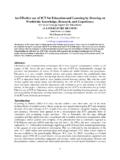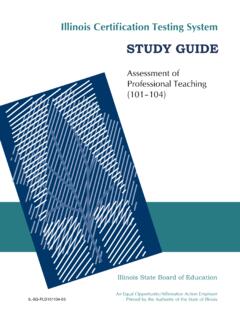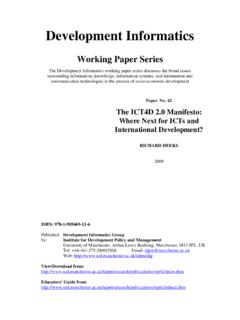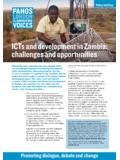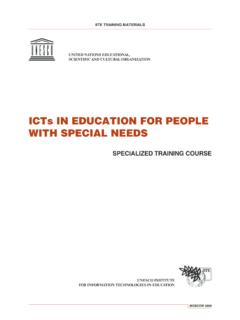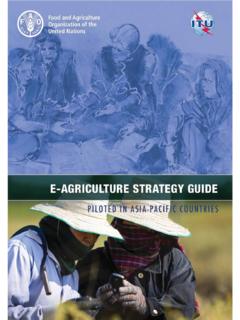Transcription of OBJECTIVES AND STRATEGIES FOR EFFECTIVE USE …
1 5 OBJECTIVES AND STRATEGIESFOR EFFECTIVE USE OF ICTSG ajarag Dhanarajan>Introduction>Policy ConsiderationsHow Essential Are icts to National Goals? icts for What Educational OBJECTIVES ?>Strategy QuestionsWhich Technologies?How Will They Be Used?Create or Acquire Contentware?>ConclusionINTRODUCTIONIn a report to the Canadian Council of Ministers of Educationon e-learning, authors reflected:In the fifth century , Plato predicted that the inven-tion of writing would weaken the oral tradition thatsustained poets such as Homer.
2 Yet poetry is still aliveand well 2500 years later. Similarly, 500 years agomany believed that the invention of printing, by mak-ing intellectual creations easily available, would dry upthe springs of intellectual creation by ending a long-standing tradition of oral debate and expression. As welook back over the last five centuries from the vantagepoint of our knowledge-based society, a decline in intel-lectual vitality is more than a little difficult to discern,though certainly there may have been changes in someaspects of intellectual life.
3 In fact, the existence oftoday's knowledge-based society is in part a testimonyto the enormous intellectual energy of the last 500years. No one would seriously argue today that theintellectual enterprise or teaching have suffered becauseof the invention of writing or new knowledge tools represent similarly revolu-tionary technologies, and we ignore them at our potential is also clear. Online learning will becentral to fostering the lifelong learning culture thatwill be essential to sustaining a civil and prosperoussociety in 21st-century last 20 years have seen some remarkable innovations inthe delivery of education.
4 Nevertheless, many would arguethat, as remarkable as these innovations are, they are nomore than a beginning. Developments over the next 20 yearswill make, as one former secretary of education, JohnW. Gardner, remarked, education as it is practiced in mostschools today [look] so primitive. While this may be over-stated optimism, Prof. Gardner s views are not totally technologies available today, and those aboutto emerge, have the potential to transform the business ofeducation.
5 However, what may be impeding that potential isour academic culture and traditions. Nine centuries of organ-ized education have generated strong views and deep-seatedbeliefs about what is best and what is not. This chapter examines the role of icts in the context of theglobal opportunities and challenges confronting the design,delivery, and administration of education to meet the59diverse needs, clients, demands, goals, and OBJECTIVES ofnations and communities particularly during a period oftransition of societies and economies from an industrialbase to one that is knowledge- and this end.
6 The chapter raises a number of policy consider-ations and outlines a series of strategic options that couldfacilitate an EFFECTIVE role for CONSIDERATIONSC ynics would claim: Some nations may decide to invest in technology foreducation for the glitz factor : the technology is there;it is fashionable to have the latest and the best, and itgives a sense of progress to use can be described as the technology for its own sakerationale. Other nations may base their investment deci-sions on the genuine case for improving the efficiencyof their education systems or for some other benefitsintrinsic to education.
7 For instance, databases and com-puterized records in education systems have clearadvantages and benefits. This is the technology foreducational benefits rationale. A third rationale may beexternal to education and concerned with developingskills for the labor different view of the use of icts is Bill Gates s, who says: Students can look at their grades and even turn in theirhomework over the Web. Teachers hold online discussiongroups. Students e-mail friends and family as naturally asthey call them.
8 Students are the ultimate knowledge job is to learn and explore and find unexpectedrelationships between things. 4In between cynicism and optimism, one government took theview that it is fully committed to ensuring that all schoolsand teachers are in a position to deploy new information andcommunication technologies [ icts ] to raise educational stan-dards to enhance learning and to prepare young people withthe ICT skills they will need in society and at work in thetwenty-first century.
9 5 This section considers the policy questions that drive deci-sions such as the one that was made by the UK governmentto promote the use of icts in its educational Essential Are icts to National Goals?This is the first question national and educational authori-ties have to answer. Is the introduction of icts into educa-tion driven by vendors, by the need to conform to worldtrends, is it derived from national educational OBJECTIVES ?Are icts considered a luxury or a necessity?
10 To help answerObjectives and STRATEGIES for EFFECTIVE Use of ICTsGajarag Dhanarajan, , is President and CEO of The Common-wealth of Learning. He is a Malaysian citizen and has been involved indistance education and open learning for more than 25 for Education60A fairer, kinder, and more concerned humanity requires thatthe education we provide must be made available to a broad-er range of historically underserved groups, including: >Functional illiterates: Apart from about 900 millionilliterates globally, there are almost half as many adultswho cannot cope with the demands of daily lifebecause they lack literacy.


